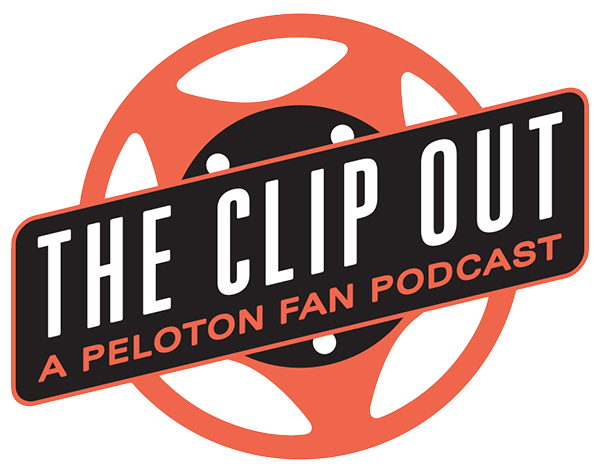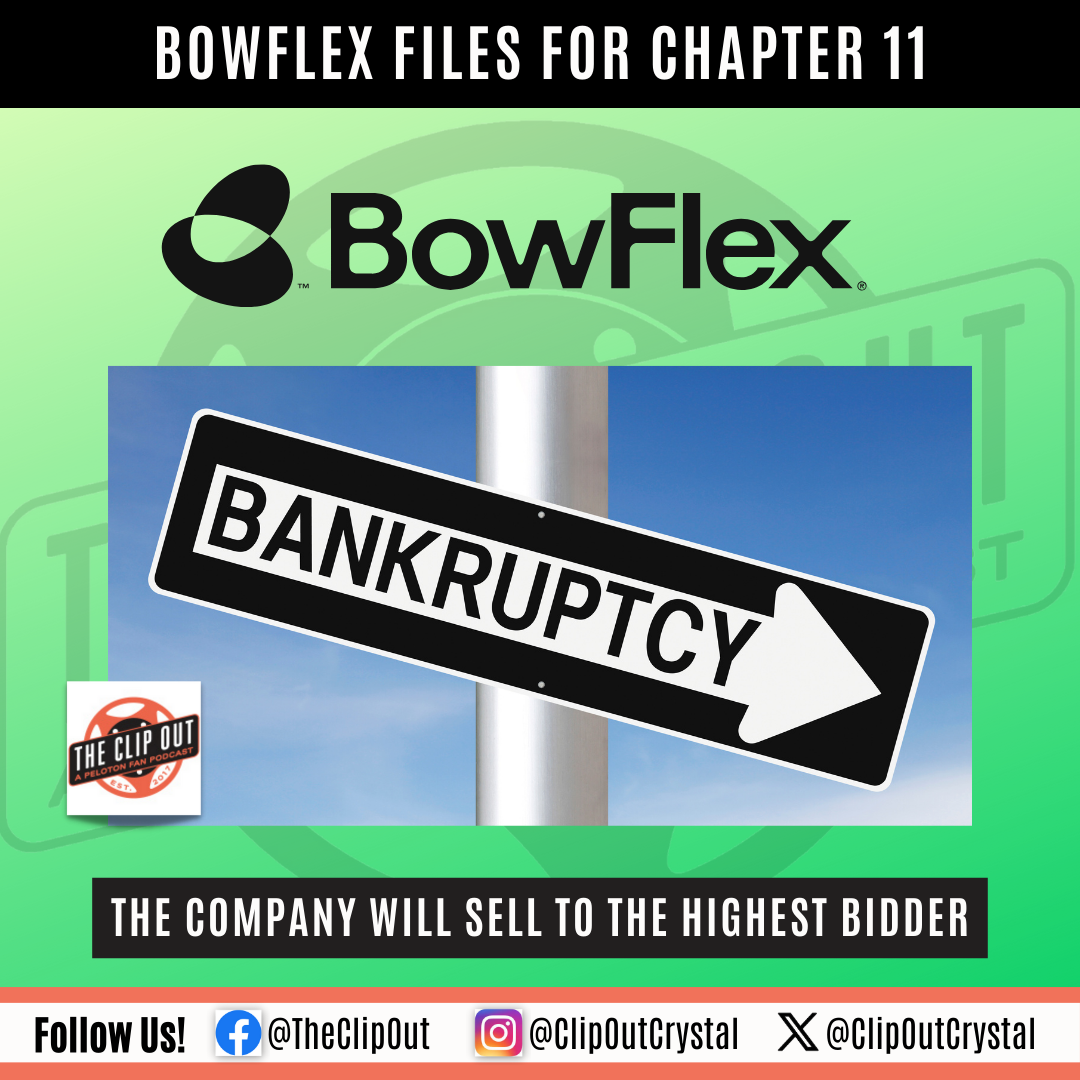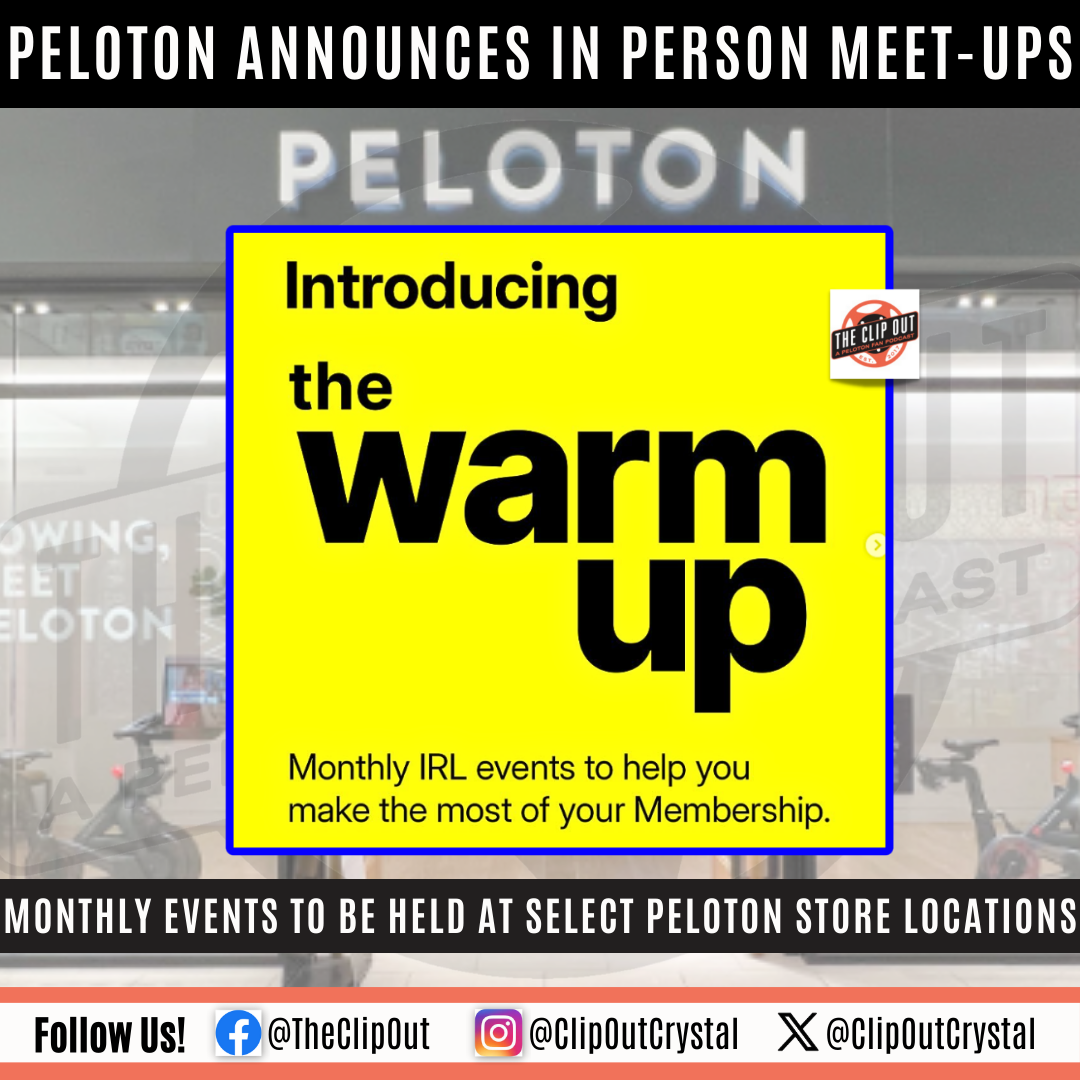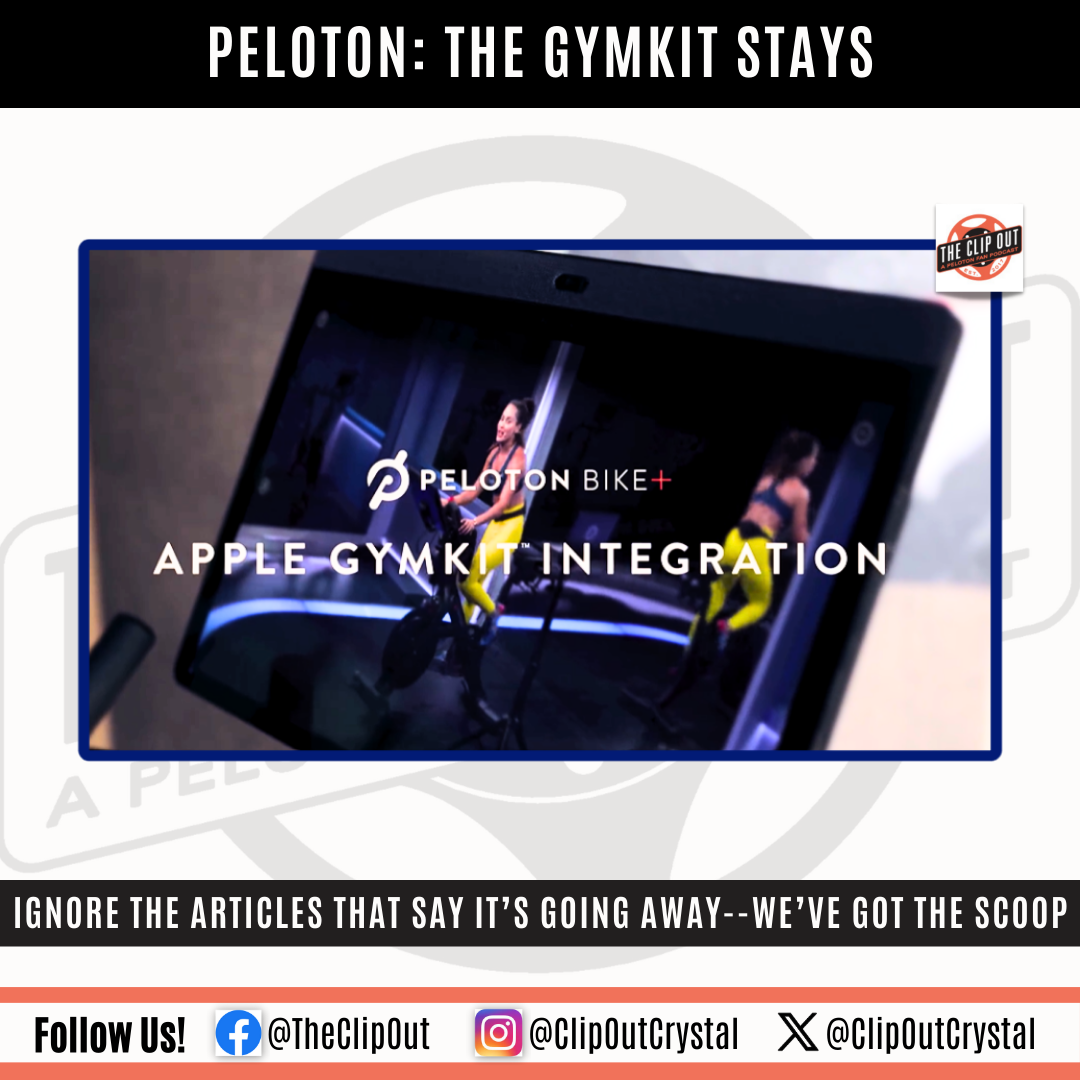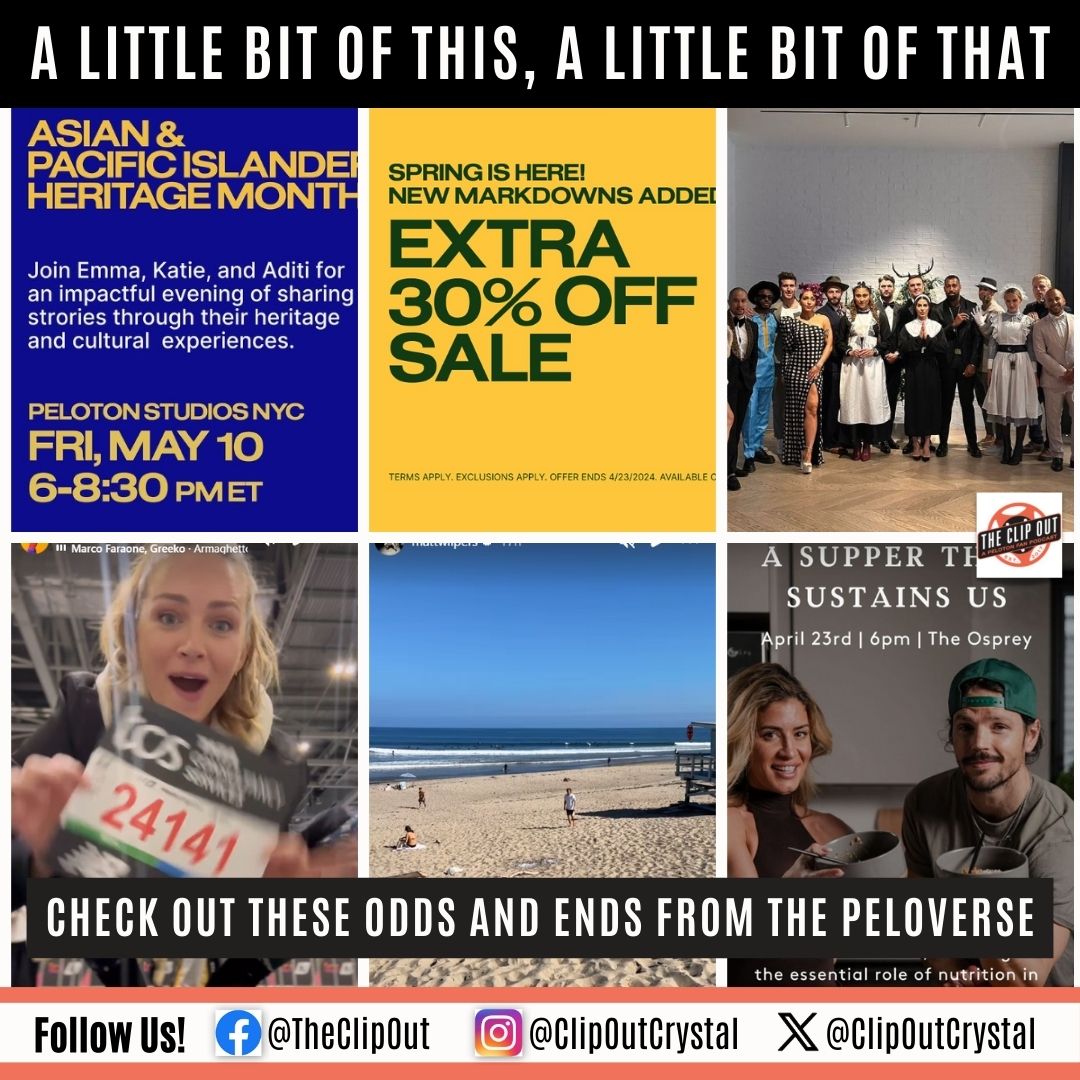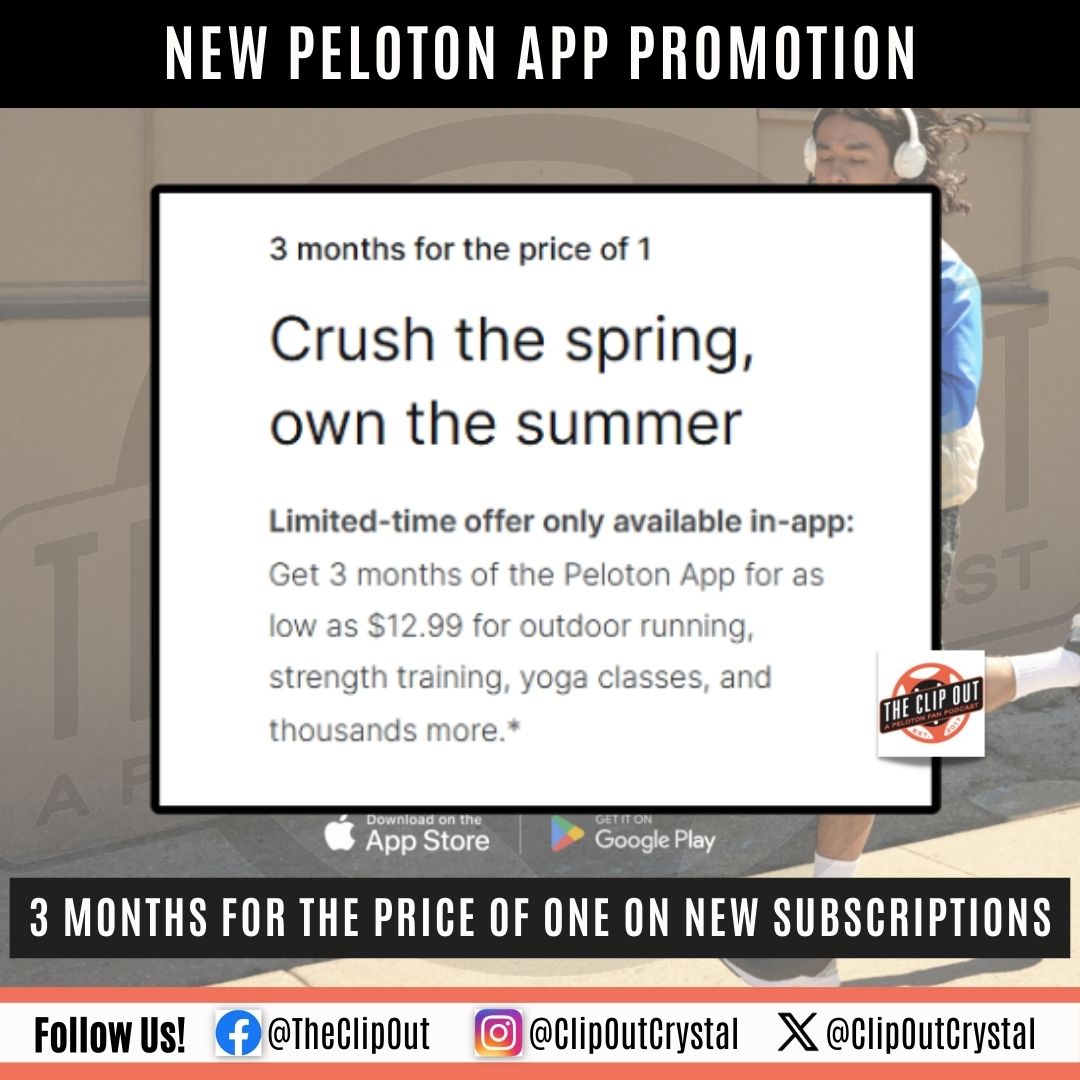146: Christine D’Ercole Takes On The Haters plus our interview with Sekou Campbell
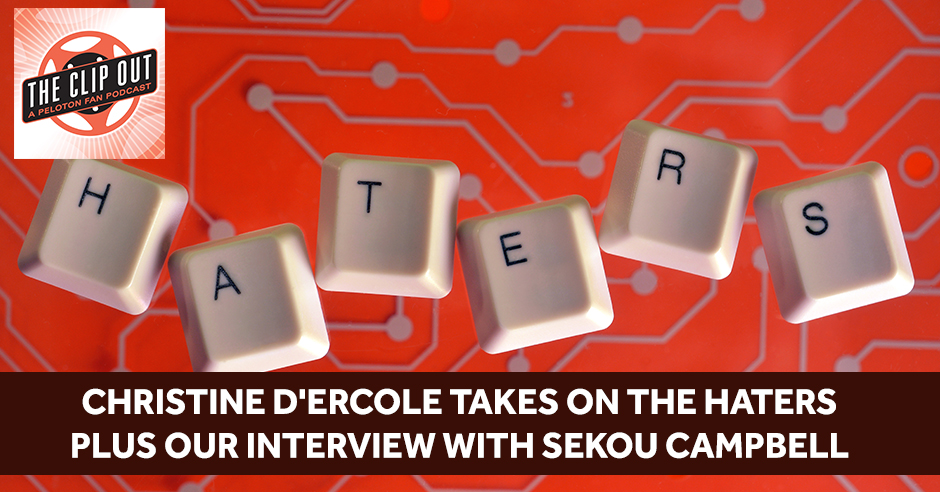
Christine D’Ercole takes on an internet troll upset with her (gasp!) accomplishments.
Yet another “competitor” has entered the market.
Homecoming schedules will be here soon.
Past guest Mae Sakharov was featured in an official Peloton video.
The Peloton Prophet is back with a prediction about the new Spring line at the boutique.
Rebecca Kennedy was featured on MindBodyGreen.com.
Ross Rayburn was featured on Bustle.
Jimmy Fallon talks about his Peloton struggles.
Bobbi Brown mentions her Peloton on her podcast Beyond The Beauty.
Trevor Noah gets in a few shots at Peloton on The Daily Show.
Crystal gets her Fight Camp equipment.
An update on Brendan Dunn from last week’s “Humans of New York” story.
The first Two-For-One Yoga class is here with Anna Greenberg and Aditi Shah!
Chase Tucker has a SOCA Bootcamp for people to check out.
All this plus our interview with Sekou Campbell.
—
Listen to the podcast here:
Christine D’Ercole Takes On The Haters plus our interview with Sekou Campbell
What do you have in store for people?
It’s a whole lot of stuff about Peloton. We’re going to hit on some Homecoming stuff. We’re going to hit on past guest updates. We’re going to talk about instructors, what’s going on with them, a little competitor news. We’re going to have a little tiny visit from the Prophet, more celebrity news and more talk about future guests and then content.
Before we get to all that, shameless plugs, don’t forget we’re available on Apple Podcasts, Stitcher, Spotify, wherever you get your podcasts, you can find us while you’re there. Be sure to subscribe or follow, whatever they call it there, that way you never miss an episode. You can also find us on Facebook at Facebook.com/theclipout. While you’re there, like the page, join the group, you could like the group as well, but you’d have to like it in real life. It’s not an actual function of Facebook. You actually have to join. You can also sign up for our newsletter, which has grown by leaps and bounds. Thanks very much. You can do that at our website, theclipout.com. Collect them all and trade with your friends. There’s a donate button. If you want to throw some money our way, we’ll take it. We have a new review. This is from byflutter. They said, “Such a great podcast. Tom and Crystal offer humor information, more humor, opinion and more humor. They are great ambassadors of the Peloton community.” With Leaderboard Name, #raconteuse.
I know that leaderboard name. That’s nice.
Thank you very much.
Also, I’m glad you had to say it because I would have never pronounced it correct.
We don’t know that I pronounced it correctly.
It sounds correct.
They’re not here to tell me I’m wrong. Let’s assume I got it right.
Thank you for the great reviews.
We love when people leave reviews. It helps us out and it helps people that stumble upon that podcast maybe decide that they should check it out. Now, we are done with this portion and ready to move on.
—
I know this might come as a shock to you, but somebody was mean on the internet.
That’s a fair thing. People are so mean. What takes me off is when they never put themselves out there ever, then they knock somebody who does. You, sir or ma’am, are a big, old weenie.
We should probably tell people what we’re talking about.
I saw a post about this, I have not watched the class. I saw that Christine D’Ercole was attacked on social media. This time she was told that she needed to stop talking about her accomplishments. I find that frustrating because I don’t think that people should go around bragging. I think that it’s important to recognize and celebrate your successes, especially women. We do so much and we’re demure about it. We should not have to be. People who say something like this, it’s like you’re insecure and you can’t handle her success. You’re projecting it onto Christine.
Plus, instructors talk about things that go on in their life all the time. Sometimes in her life, she achieves things, that’s going to be a thing.
She is one the most accomplished athletes that Peloton has. She’s a gold medalist, multiple times and that’s amazing. I am proud of her. I could never do what she does. I realized that she doesn’t have the same body type as other instructors that maybe annoys people at times, but I think it’s amazing. Her body is built for power and she uses it, and that’s fabulous. Let’s celebrate that. I don’t understand it. Why do you take time out of your day to piss on somebody else’s good thing? Why would you do that people. Whoever wrote that needs to go read some Brené Brown.
That’s one thing to recommend them to do.
We take a different tack, Tom.
I was like, “Why don’t you go read a book?” That’s not where I landed.
I was trying to say they to learn better ways to deal with things. Christine responded in the ride and this was on the 45-minute ‘80s ride on March 2nd. She said that this person needs to find another instructor, perhaps another fitness workout overall because that negative attitude is not what Peloton promotes or encourages. Jealousy is not becoming.
They should get a Flywheel at. Wait, they can’t do that.
There are plenty of other knockoffs out there.
They deserve an Echelon. That’s what I think.
Just don’t follow. If you don’t like it, hit unfollow.
It’s very easy. Speaking of knockoffs, there’s a new one. I believe it was Andy Warhol who said, “Everyone will be a Peloton knockoff for fifteen minutes.”
No, but it’s fair. I have to give a shout out to John Mills yet again. He’s been on target getting all these news articles. This one is called the Stryde Bike. Here’s the thing, this is the difference. They have no studios. They claim that they have partnered with top cycling studios around the country and they record classes in their facilities. So far, they have partnered with High Ride Cycle in Denver, Vibe Ride in Atlanta and Detroit, Ride House in Dallas, RedBike in Miami and City Cycle in Seattle. They also claim they’re affixed Android tablet is open, meaning you don’t need their app or subscription to it. You can use it as a standard tablet, watch Netflix or any other Android app on it.
It’s a bike and you get a tablet?
Yes.
I think what it comes down to is it’s like Peloton has gotten so huge, you can make a living off of their crumbs.
Everyone wants a piece of it
We’re guilty of it too, but at least we started before the other people did.
I would also say not only did we start before the other people did, but we recognize greatness and celebrated it.
We don’t have our own bike that we’re selling.
Last I checked, we were not asking anyone to pay us for this, unless you’re doing something over there you’re not telling me about.
Lawsuits arise in the first place because no one knows what the boundaries are. Click To TweetHomecoming is getting closer and they should be giving us some idea of what it will look like here soon.
Schedules are due out on Monday, March 9th. As a reminder, I expect everyone that’s on the waitlist to get moved up on the waitlist because I have a feeling we’re going to be seeing a lot of dropouts that day. This year you don’t get to choose your class, you get put in a class.
Some people might get all huffy.
They got huffy in 2019 and they got to choose and they got very mad when they didn’t get what they wanted. I have no doubt that that’s going to happen when it’s chosen for them. There are some people who do not want to be on the Tread. They might have reasons or medical reasons why they can’t do the Tread. Then you have people who aren’t interested in yoga. The Bike is their flagship piece of what they do. Everybody wants the bike. I want a great opportunity to be with other instructors I haven’t had a chance to be in a class with. I’m good with whatever I get. I will be happy. It’s a new experience and it’s only one class for the whole weekend. I don’t go for the class. I’m taking the classes at home. I go to see and meet all the people. Not everybody has that attitude about it. I’ve adjusted to it over the time period.
You’ve got to make your peace with it.
If you want to take lots of classes, Homecoming weekend is not the weekend to go. It’s not going to happen. You could go early and sit in the studio and do it that way. If you’re not prepared to do that, then Homecoming weekend is not for you.
A past guest update, a few weeks ago, Peloton put out a promotional video featuring The Mills. There’s a new one this week featuring yet another past guest.
Her leaderboard name is #MaeMay. She was episode 57, if you are interested. Mae is one of my all-time favorite guests. She’s such a great guest, so well-spoken. She’s smart and she’s sassy. I love that and I hope that I am like her when I am in my 70s. I hope I have her mobility and her ‘get up and go’ and still to be working. She’s fabulous.
You’ve already got the smart and sassy. You’re off to a good start. You just need the glasses.
Congrats, Mae. You deserve it.
The Prophet has a prediction.
The Prophet is telling us that we are going to be seeing the new spring line dropping. It should be out before this episode. I am hearing that it’s going to be the evening of March 4th, that it’s going to be out online and then it’s going to hit the stores on March 6th. They did things a little bit differently this time. It’s brand new, never done it before. They did a sneak peek at the spring line. One outfit, male outfit, one female outfit was placed out on sale early. You could only get it through social media links. If you went to their store, you would not see it. I thought that was very interesting. I’m curious, why would you do that, marketing guru. What’s the point of that?
What did that cost me?
Nothing. I’m not a big pastel color kind of person. I’m curious what the rest of the spring colors will be. I don’t know, it’s not my color. What they put out wasn’t my color. I want to see what the rest of it looks like before I commit. If that was the only thing that they had, I probably won’t because I have a sickness.
Recognizing you have a problem is half the battle. Rebecca Kennedy was featured on MindBodyGreen.com, which I thought was a site for fan fiction about the Hulk.
No. It’s also not about weed, which is what I thought. This is actually a blog from Westin Hotels and Resorts. It is all about Rebecca Kennedy’s tips for fitting in fitness when you’re on the go. She had a similar article to this not too long ago. I think this might be the same thing, maybe they reused it. It was in December and they put it out again on Instagram. Rebecca Kennedy put it on an Instagram. When I was reading through it, there were some good tips and we’re getting ready to travel a lot. I wanted to make sure people saw it. It’s always great to support our instructors and let them know we saw their content. There’s a video, which I don’t remember the video being attached to the last one. Maybe there was and I didn’t look that hard last time. That also could be a thing.
I feel like your tip for fitness while you’re traveling is like, “Step one, go to Homecoming.”
That can’t be the tip. The first weekend in May, that is my tip. If you don’t want to bring exercise clothes, go to the Peloton Warehouse Sale, buy all the workout clothes and then work out all weekend.
They’re so cheap, you can pitch them when you’re done.
The only thing is you’ve got to wait online for three hours to get in there and look through the boxes. It was a thing man. When we went, it was dead compared to the first day.
We went on a Sunday, but everything was pretty picked over too. They had a lot.
Not only did they have a lot, but the prices get cheaper throughout the weekend. Even if I didn’t know something was going to fit, I just bought it, “It’s $5. I’m going to buy it.”
It’s like the last day of the book fair.
I’m so excited. I can’t wait for the Homecoming.
Ross Rayburn was featured on Bustle.
I don’t know much about Bustle.com, but what I do know is that it was a great article about how meditating changes your workout. It wasn’t just Ross that was quoted, but it was all about meditation in general, and he was one of the instructors that was quoted. We’ve got to give him props. That’s exciting. He is an amazing instructor. He’s got a great meditation voice too.
Does he put you to sleep?
Yes, he does. It’s very soothing. He’s so calm. Just thinking about his voice is making me get quieter right now and calmer. Maybe I should have listened to him at work today.
I’m going to make it your ring tone. Whenever you start to get amped up, I’ll call your phone quickly. I’m going to talk about our guest, Sekou Campbell. We’ve been trying for years, and it’s been a long time to find someone that knows about music licensing and how it relates to Peloton versus TV and movies, and why it’s so complicated. Why didn’t they do it from the start? It’s obvious when you don’t know what you’re talking about. We finally found someone that knew what they were talking about and was willing to come on and talk about it. That was very exciting to finally get that.
What a great interview too. He’s very talkative for an attorney, in a good way, not the boring, dry talking.
Once he realized we weren’t going to sue him or something, he’s like, “I can talk to these people. They’re real people.”
He was super fun. I loved it.
We’ll just say this, New Jack City. You’ve got to read to it for no other reason, the New Jack City. Does that have to do with anything? That’s what you call a tease.
I’m glad you brought that up because it’s such a great interview. There are so many people that have been like, “What is this about? What does it mean that there’s a settlement?” We cover all of that and we cover it from an actual expert standpoint. We talk about how it applies to other industries as well, and why this is different specifically for Peloton. Good point, Tom. I’m glad you called that audible. Thank you.
There were a couple of new celebrity related Peloton items.
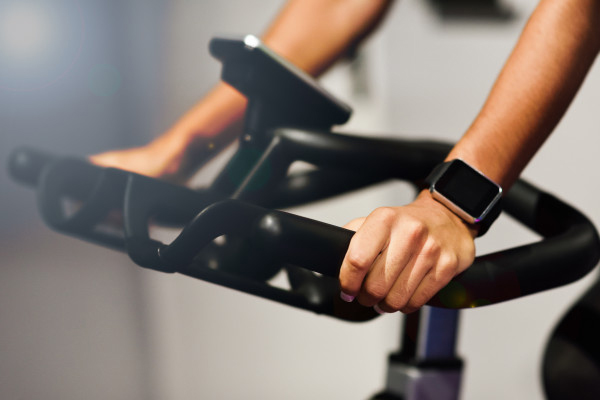
Music Licensing: No one gets into a venture like Peloton without tolerating a lot of risks.
It’s exciting that Jimmy Fallon posted about Peloton, but it also was a little sad. He’s having some trouble. He’s having some motivation trouble.
He was saying that he bought a Tread and only used it a few times, and now he’s trying to get back to it.
Peloton shared it. If you want to join in to motivate Jimmy Fallon, if you believe him, look at his Instagram. I’m suspicious. You should post your workouts and use the hashtag, #UseItOrLoseIt, when you post it. He asked for people to do that, to give him motivation. We are the Peloton community, so that’s what we do. We adopt people. We pull them in and then we lift them up. That’s going to be a great thing to do. He’s going to share people’s actual post. I hope that maybe one of us out there in the Peloton community actually gets their share. That would be pretty cool.
I think that hashtag isn’t quite right. It’s #UseItAndLoseIt, not ‘or.’ It’s not a user. It’s like you’re going to use this equipment that you have and now you will lose it.
I’m glad you caught that. Thank you.
That’s what I’m here for. Also, Bobbi Brown, not from New Edition.
I don’t know anything about her, but I know it’s a ‘her.’ She has a podcast and it’s called Beyond The Beauty with Bobbi Brown.
It’s a cosmetics company?
I think so. Bobbi sat down with her nutrition expert and her nutrition expert is Lauren Slayton. The name of the episode is What Should I Eat and Why Am I Always Hungry? With Nutritionist, Lauren Slayton. The point being that in the middle of this podcast is that Bobbi Brown talked about her Peloton.
It was funny because when I was like, “Bobbi Brown, not the guy from New Edition,” and you’re like, “It’s a female Bobbi Brown.” I was instantly like, “It’s the model from the cherry pie video.” I promise you that was her name. There are a lot of men of a certain age go like, “The girl from the cherry pie video.”
No, it’s a different Bobbi Brown. Now that we’ve settled that, check out the podcast.
Finally, closing out our celebrity segment of the podcast, Trevor Noah had a couple of Peloton jokes.
What’s the name of that show that he’s on? I can’t remember.
The Daily Show.
We never watch it, in my defense. There’s a video of that in one of his episodes and it’s about two and a half minutes in. He gets a couple of digs at Peloton, in case you want to hear some not like mean, but joking some Peloton jokes. I believe it was all about the Coronavirus. My understanding is the jokes were in relation to that.
They’re just stealing stuff I said on the previous episode probably.
They’ve probably listened and he took all your ideas. Check it out.
You’ve got new play things?
I did. As one of your friends pointed out, a new exercise toy. Calm down.
I will say unassembled, you might have got it from AdamEve.com.
It wasn’t. It was a new exercise toy and it’s called Fight Camp. I haven’t gotten to use it yet because you assembled it. It’s not like the Peloton or the Tread or even the Tonal that requires a lot of installations, so you can easily do it yourself. He was standing in the room.
I would say helping.
My daughter did most of the work, a thirteen-year-old girl.
I was supervising. I don’t see gender. I don’t want to be like, “Girl, you sit over here. Let the man does it.” I’m trying to help her.
You’re letting her be herself and find her talents, which she actually is incredibly mechanically inclined, more than I am for sure.
Anybody pretty much is more than me. It was a relatively simple process.
We’re waiting because you filled it and we’re waiting for all of the stuff that we filled it with to be all settled. You’re going to get to hear about my first workout on the next episode.
I’m getting a little nervous though.
Why?
Because the way the basement was structured, it was your fitness stuff and my comic books.
You didn’t want to do your comic books with me.
Where am I going to put them? You keep your encroaching on my comic book area. I need a bigger house.
I’m super excited to try it out though. I think it would be really fun.
People will have that to look forward to. You’ve given them tales of Fight Camp. We talked about the Humans of New York guy, whose name we now know, Brendan Dunn. He reached out.
Thanks to all of you. I had several people reach out to me and give me his name. Thank you for that. I appreciate it. Somebody gave him our email address and he emailed us. We’ll get to interview him, so it’ll be a few weeks before we’re able to air it. We are going to get to interview him and I am super excited about this. He is pumped. Just in case anybody wants a little tiny update, he has been completely adopted by the XXL Tribe. He has been working out every single day since. I’m excited to see where we are later in the process.
Music is an important part of working out. It's part of the experience of Peloton. Click To TweetGood for him.
Also good for our awesome community. That’s what we do. We lift people up except on the OPP.
We had the first Two for One Bootcamp.
Yes, it was with Jess and chase, which was awesome, the first 30 minutes anyway. I didn’t do the second-half. I’m sure the last half was just as awesome. I was exhausted from my Tonal, so I got off of the Tread. I’m sure the whole thing was good. I felt bad because I only did half, so that was my guilt speaking.
Coming up now is the first Two for One Yoga.
This is so exciting. It’s going to be Aditi and Anna Greenberg. They are going to be doing the first Two For One Yoga. It’s also celebrating Women’s History Month. If you haven’t noticed, if you don’t get the newsletter, you may have missed that there are tons of Women’s History Month classes this whole month, and this is going to be one of them. It’s going to be celebrating and honoring women who have lifted us up throughout the decades of our lives. They’re also going to talk about some of their favorite athletic fashions throughout their lives while they do the Two For One Yoga.
Finally, there’s a SOCA Bootcamp.
I think that means Southern California. I’m not that down with the kids.
I think it’s SOCAL.
I could be wrong.
People are so busy. They don’t have time to say SOCAL.
I also could just be wrong. There’s that.
The only thing I know about Southern California culture, I learned from Sublime.
I think this is more the hip hop side of things, but again I could be wrong.
Now it’s making sense. It’s also explaining why I don’t know about it.
Because whenever you hear a radio DJ, you were not doing.
I was all rock.
Here’s the thing, Chase Tucker, your favorite country star, did a bootcamp all about SOCA. It was amazing. He danced during the floor routines like you were dancing as you did the floor routine. It was basically a dance party, which you can’t get much better than that with a bootcamp. Bootcamps are tough because you run and then you hop off the Tread, then you lift the weights. This was like doing body weight exercises while dancing. It’s good stuff, very entertaining. You need to check it out.
—
Joining us is Sekou Campbell. How is it going?
I’m good, Tom. How are you?
I’m doing well. Thank you so much for joining us. I feel like whenever we talk to attorneys, I’m like, “I know what their hourly rate is.”
By that token, we need to give everybody a heads up. As my usual question, how I always start these interviews is, “How did you find Peloton?” My understanding is you do not ride Peloton or use Peloton.
I’m not.
That’s fine. We came across the article that you wrote for Law360 and it was all about the different transactions and sync licensing. It’s all about Peloton and the lawsuit they had with MMPA. That’s when we reached out to you. You were kind enough to accept our begging of you to be here. We have had such a hard time finding somebody who gets this.
A little background, music licensing has been the thing with Peloton for a while. We’ve been trying to find an expert in the field, someone knowledgeable. My background is in radio. I’ve reached out to people I know and music labels that manage rock bands like Metallica and Shinedown. Attorneys, people that work at Spotify, people that work at Interscope Records and everybody’s like, “We don’t understand it.” I’m like, “You do it for a living.” They’re like, “Yeah, but we don’t understand it. We don’t know why it works or what happens and who gets paid how. We don’t want to talk about it.”
Having said all that, can you give us a little bit of your background and how you came to know all about music licensing?
First, I’ll give you the disclaimer that I certainly don’t know about all of it. It’s accurate that no one knows all about this. A lot of what you’ll likely hear me say is, “I don’t know or no one knows.” This is why lawsuits like this arise in the first place is because no one knows what the boundaries are. I started in litigation. I did a lot of entertainment-related litigation. I’ve been doing more transactional work across a ton of different mediums from literary to music to film, TV. I’ve had to dabble on both sides in music licensing for various reasons including sync licensing. I’ve also worked with several tech companies, which is what intrigues me about Peloton is the fact that in this space, in particular, these questions would be difficult to answer.
It seems like what we were running into and what Peloton is running into is essentially uncharted territory. If you have a radio station, everybody knows what the rules are.
One thing I feel like I want to put out there if you’re comfortable putting it out there is that, I have had many people say to me or post on Peloton all their pages and stuff. Peloton should have been on top of this. They should have known they should have done the right thing. Tom and I have said we feel like we’re shouting it from the rooftop like, “It’s not that simple.” From your advantage point, would you agree it’s not that simple?
It’s certainly not that simple. A lot of it is a game of risk. In some sense, everything that they did involves some risk. No one gets into a venture like Peloton without tolerating a lot of risks, which is also rewarding. There’s a lot of growth to Peloton. You have to balance those things out. In my article, I reference the DMCA, which is a reference to sites like YouTube. When YouTube started, there was no DMCA. There certainly could have been a lot more risk for them and they got a law that helped them out, which was what I was saying in the article. There probably will be more Pelotons and they’ll probably need to have a law passed, so that we can figure out this space in a more concrete way rather than having multi $100 million lawsuits.
For the uninitiated, can you explain what the DMCA is and how it helped?
The DMCA stands for the Digital Millennium Copyright Act. Copyright Law has been around for hundreds of years. The basis of it is in the Constitution since 1789. The last major revision of the Copyright Act was the year I was born, 1976. That’s a pre-internet, pre a lot of stuff. Around the turn of the Millennium, the DMCA was passed. One of the features of the DMCA is to create safe harbor. There are tons of safe harbors in the law for all kinds of things. This one is for internet service providers like YouTube for allowing others, individual users to post potentially infringing copyright at work. If I go on and post infringing work, YouTube is not automatically liable or secondarily liable for what I post if they have a particular set of procedures in place. It’s called the Take Down Procedures. YouTube is big. A lot of it is automated, but you’ll see if you post something, sometimes it’s automatically blocked. If I’m the copyright owner and someone else put up my work on YouTube, I can contact YouTube and have them take it down and then they let us fight it out before they put it back up.
It is largely automated because I run into this problem with what I do in my day job, which is a concert promoter. Sometimes I’ll need to post a commercial that the band provided me to YouTube and then YouTube will tell me, “You don’t have the rights to that music.” I’m like, “The band told me to. I’m only utilizing it to promote the band’s show.” It’s gotten better. They’ve flagged certain accounts where they know like, “You’re at a concert venue and this is different.” They let you do it. It is automated and it can be a nightmare.
That sounds to me like captchas. It’s like, “Find the sidewalk.” I’m like, “I am human. Please, let me.”
You made the sidewalk tiny. I can’t see it.
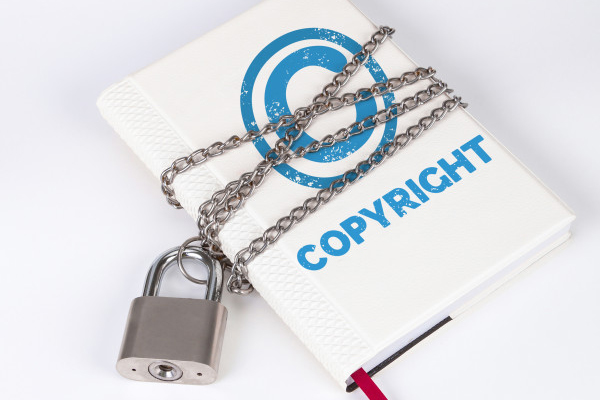
Music Licensing: Copyright law protects a couple of rights because they’re intangible. There’s no way to exclude anyone else from using them in any way they see fit.
Sometimes you have to start to have an existential crisis.
You’re not a Peloton rider, but you were interested in Peloton enough to write the article. How did that come to be?
I’m an avid runner. I was and I started getting back into it. I ran five half marathons before I went to law school. I went to law school and it all went to hell, sedentary lifestyle, have more kids, all that stuff.
Time to get a Peloton Tread, I’m just saying.
I decided it is the time. My youngest is five and he’s more self-sufficient. I can’t leave him home alone, but I certainly have more time to get up early and work out.
You can leave them home alone. It’s not advised.
A lot of stuff happened. Over the summer, I decided I’m going to focus on this. I’ve been conscientious about getting up and running. I usually do it in the morning. Almost every morning, I’m sure your readers will be familiar with this, is that ad that says, “Are you that person that gets up before dawn, before the sunrises?” Are you familiar with this ad?
Yes.
Almost every morning, I hear it and I’m like, “Peloton, this is a thing.” I noticed it more and more. I have some colleagues I know who use it and love it. I’ve seen the great things and some of the controversies about Peloton and thought, “This is a neat idea.” I work with some tech companies that are on that nice edge as well. I’m always interested to know and I’m also interested specifically in this issue about the competitive versus anti-competitive issues and copyright. How would Peloton deal with an issue like this? Music is important in my come back of working out. I can imagine that any Peloton user music would be critical as well. In every ad, it’s such a big part of it.
One of my favorite ads is, “Ready or not,” where he’s singing off-key. Those are great. It’s true. I was talking to a colleague of mine who is clamoring for instrumental tracks just so the words don’t get in the way of your workout. I was like, “That’s a great idea to do workout tracks that are instrumental.” That’s smart. The point is that music is important to work out. I thought this is a great, interesting, nice edge question that doesn’t affect. We talked about DMCA. There are other stop-gap measures that copyright law has implemented to deal with the advancing technology. This one has not yet been addressed. It hit Peloton particularly hard, but I would imagine there are a lot of other companies out there for which this is going to be an issue.
Do you feel like there is something they could have done to not be in this situation, either not existing or writing a blank check to anybody who wrote a song?
They’re doing it. I mentioned some of this in the article. I looked through their LinkedIn and who they hired and their music division. A lot of what they’re doing, they hired a lot of former record executives essentially and music supervisors from TV to help them. That’s probably the right idea. I don’t know enough about their business to know whether they could have attracted those people earlier. There’s also this question of how much capital do you have to recruit those people? How many resources can you devote to? That’s the best move given the environment in the short-term. I’m hesitant a little bit because as a lawyer, I don’t want to say, “Go break the law.” On the other hand, on some level, sometimes you have to manage that risk and be willing to take those chances to figure out how to negotiate a deal. Sometimes I say litigation is simply transaction by another means. It’s peers like that who may have been, “What was that play here?”
I didn’t say it as eloquently. I was making this argument the whole time this was going on. They’re in uncharted territory. Nobody knows what the rules are. Sometimes when you don’t know what the rules are, you can either sit on the sideline and wait for somebody else to do it and reap the rewards or you jump in and knowing you’re going to get sued. You go to court and you guys fight and then you figure out what the rules are and you know. You write a check-in and you move on. I was saying this for a long time, then it’s like, “I don’t think this was ever about them refusing to pay. If it was, every record label, every publishing company in the world would be coming after them.” It was more a handful of them that they couldn’t reach deals with because they didn’t agree with the dollar amount. They were like, “Fight me.”
There’s precedent for that. There’s Google Books. I had long drawn-out litigation, essentially the same issues in scanning books. There’s a history of particular technologies that are on the cutting edge not knowing what the law is because there is no law because it’s a brand-new technology. You figure it out.
At some point, I want to have a little bit of clarification for people who might be reading this for the first time. We probably ought to explain what licenses Peloton needed and where exactly the disconnect was. What was missing? I want to make sure we address it.
Didn’t Spotify do something similar? When they launched, they didn’t have all their ducks in a row over who had the rights to what. They went ahead and did it and then figured it out on the fly to a certain degree.
I listened to an interview with the founder and he was talking about that. It’s the Netherlands or Sweden. In Sweden, they gave up when he started out. They didn’t enforce. He was like, “This is great.” I’m exaggerating. I’m sure they did something, but he had a free reign in Sweden when they started and once the law was caught up with him, it was too late. They already had this great business model and they had to figure it out on the fly, as you say. They have large legislation in place. That’s the evolution of these things. They get first someone as a bandit. There are litigations and there’s some case law, then eventually there’s legislation that comes up years later. That will likely happen here because Peloton will get competitors and already are getting competitors.
This issue will continue to become relevant, for sure. Crystal, to your question, I would love to talk about some basic copyright principles. Copyright Law protects the number of a bundle of rights because they’re intangible. There’s no way to exclude anyone else from using them in any way they see fit. Unlike a house where you can put a lock on the door and no one else can get in your house, you can’t do that with things like photographs, choreography, music, film. Those are all copyrighted. It’s anything original, fixed in a tangible medium. That’s it. It has to be fixed in a tangible medium. It’s deemed to be copyrightable and copyrighted once it’s fixed. Their registration gives you a bunch of additional rights. All you have to do is write it down or otherwise fix it in a tangible medium. There are a number of them, things like reproduction, distribution, derivative works. Once you have those rights, you can slice them up any way you want.
Music is a particularly complex one because there are a lot of components to music on the creation side and there are a lot of outputs on the other side. There are a lot of ways that you can own the music and there are a lot of ways that you can license it to be used. I call it a layer cake. You have the music itself, the notes of the composition, the lyrics, the recorded sound, that’s the sound recording. Copyright. Those are all different rights. They can be chopped up and combined in different ways and different people can own them. You have the uses of them, which are myriad. You can own a CD, which is a copy of the recording reproduction. You can have it streaming. You can have what Peloton does, which is a sync license, which is that the music is an audiovisual work. Before Peloton, the most common use was film and television. You watch a movie, there’s some great music on it. That film producer had to get a sync license and probably a master use license from the owners of the sound recording and then composition. That was the thing that’s an issue when you’re producing a film or a television show, you have time.
You have a pre-production period where you go through your rights clearances and you scope out. You have a music supervisor who figures out what music is going to be in there, what the budget is for that, and then go negotiates those rates for that music. From reading the case in Peloton, this makes sense. You create a workout, it’s fairly quick. It sounds like they were doing it with days or maybe even hours they were saying before they were going live with them with the workouts, which makes sense. A great song comes out, you have a DJ, you’re ready to put this work out together and it probably gives the workout that much more vibrance. You will know more about this than me. Looking at the comments from the community, it seems like that was a big factor in the use of the bike was how great the workouts were. I would imagine a lot of that comes from how great the music was. That was the real issue. There was not the kind of preproduction time that you have for a film or television show.
Let’s say they have a workout A and it has a song in it, then workout B also has that same song. Do they have to get a second sync license or does the first sync license last a long period that somehow covers both?
In the traditional film and television world, those would be two separate licenses for sure, but those are things that you could negotiate. For example, like an opening to a show. You would negotiate the opening for all the shows. You wouldn’t do it just for that.
When Wonder Years uses Get By with a Little Help From My Friends from Joe Cocker, they would license that because they know they’re going to use it every week. It would be under a different license. If they use Bookends by Simon & Garfunkel on one episode, which was a good one, they would need it once.
In episode 1 and then episode 5, they may need to pay extra for it. This is what’s difficult about it is that it’s negotiated. They say, “How long are you going to use it for? How many episodes? Is it at the opening credits? Is that the end credits? Is it at a dramatic part of the scene?” There’s a lot of negotiation about how the song is used sometimes.
They might pay more if it’s driving home an emotional beat in the scene. They might pay more than if it’s they turn on the radio and it’s playing in the background.
Exactly, they may.
If that’s happening or when you do these sync licenses, would they be negotiating with the publisher or would they be negotiating with the people who wrote the song? Who are they negotiating with when they make these deals or is it both or multiple?
Both. You need all the rights. You need the composition, the music and the sound recording rights as well.
Let me give you an example of something we ran into. I’m weird and we were watching St. Elsewhere. I’ve noticed that they didn’t maintain rights to songs because there are many times when they’re playing a song where it must have been something contemporary at the time and made sense, but we get generic rock songs. We ran into one the other day where they were singing Psycho Killer by the Talking Heads. The character was singing along, so they had to license that song. They couldn’t drop it into something generic, but they didn’t license the Talking Heads version of Psycho Killer. They got a sound-alike band to do it.
They didn’t have to pay for the sound recorded.
That song was written by the guy who sings it. I’m confused about why he would give them the rights to the song but not the rights to his version of the song?
He may not own the masters. Maybe it’s the record company that owns it. Where were you watching St. Elsewhere? Was it on the broadcast?
It was on streaming. We were watching it on Hulu.
That’s an interesting topic I’m also interested in. I don’t know as much about it, but I’ve been reading about this issue on Netflix as well. There’s almost like an orphan works issue almost where they either can’t find the owners of the rights or it’s too expensive or what have you. People are becoming interested in these. Friends is one of the most streamed things on Netflix. These older shows are becoming popular and they don’t necessarily have all the rights that they should have. All these other rights like these are not licensed. That’s interesting. I would imagine if it were broadcast you would have those. That was this the case that Peloton tried to cite in its counter claim. It tried to cite a case involving syndicated shows on broadcast, which they do negotiate with the publishers to get those rights on broadcast television shows.
I know WKOP famously had a lot of issues because they use a lot of music. The way I understand it, you would know this better than me presumably, that they had negotiated the rights for the original episode and three re-airings. It got them through their first round of syndication and then they had to pull out all the songs and they licensed it. They shot the show on video because there was a special law that if a show was shot on video, it didn’t have to pay the same as a show that was shot on film for music. It was intended for variety shows. They shot it on video so they could get the songs cheaper. When the show ended up in syndication, they lost all the rights because they didn’t think about the fact of like, “What if somebody cares about the show years from now?”
There's a finite amount of music that can actually be created. Click To TweetI’ve referenced it slightly in my article, there are people out there, I’m not sure I buy-in. These are scholars who think about this in the practical real world. I’m not sure if this would fly, but there are people who at least argue the fair use of angle to this that sync licensed music is fair use. That’s a hard argument because the economic impact that would have of the music industry, which has already taken a ton of bank, would be pretty significant. There at least is an argument to say, because a lot of the things that I talked about, the Google Books, VCRs, recording, those are the things that any new technology often gets deemed fair use. That’s another line and they didn’t do this. They didn’t wholesale pay anybody for the music. If they had, they could try to argue that this was fair use. That’s a hard one. I don’t know how far that would get you in the industry. It’s an argument the scholars make we’re talking about.
If they had tried that though, I believe that I don’t want to play lawyer. You’re the lawyer here, but I believe a legal term for that would be douchey. What is your take on the settlement they reached? Have you got a chance to look at that a little bit? Do you feel like that was a win-win? I know sometimes they’ll put out a press release and say, “We all agreed and we’re all happy.” You guys can read between the lines and be like, “What does that mean?” Do you have any insight into that?
It doesn’t solve the problem. The reason I wrote the article is that there is a real issue with the fact that copyright intentionally confers a monopoly on the owners. Whenever you create a piece of artwork, you alone own it. That’s a good thing. We want that so that artists can make money. The problem is when you get to this level of complexity, you have what we often call a holdout problem. These handfuls of publishers essentially because you need all of it, they can charge whatever they want at some point. They can hold it hostage. That’s an issue for anyone in new technology. If you look at the arc of new technologies in this field, they’re more of them more frequently. You had the printing press and a few 100 years later you had the phonograph and then radio and the TV. Every two years, there’s a new technology that has major copyright implications.
My refrigerator plays music.
There’s going to be much in the next five years that I worry that this method, some bandit will go out there. I don’t mean to call Peloton a bandit, but somebody goes out there to test the waters. There’s litigation, case law. That’s an inefficient way to figure out the economics of a market like this. I’m hoping that we can figure out a way. My take on the settlement is that it’s great for the publishers. I want musicians to earn their money. It’s a great new revenue stream for musicians. We should applaud that this hopefully will take off. I feel like the way we get there is inefficient and requires paying folks like me a ton of money who don’t make music. Great for those lawyers, but I’d rather go to the musicians and the folks who make Peloton and the lawyers frankly. If we can think together as practitioners about how these economics work, we can figure out a more efficient system.
The unintended consequences that they’re incentivizing the bandits because they’re leaving people with no other option.
It stinks for new innovation. It also penalizes innovation. It stifles that creativity. I have a tonal, which is a strength Peloton. It’s Peloton, but with strength and what they do, and in my mind to get around it, is they don’t have live classes, it’s different anyway, but they also have a radio station. Several different radio stations you can choose from while you do your workout. I’m seeing that lots of these other companies that are like Peloton are going that direction. It’s interesting.
I had an end-run idea around the music licensing. I’m curious if this would work or if I would end up in jail. The Peloton screen is essentially a tablet.
Don’t forget the third option.
What’s that?
It’s douchey.
We always assume he’s leaning towards douchey.
Since this is a tablet, what if you signed into your own Apple Music or your own Spotify account and then they had a playlist built and you streamed it from there while you watched the workout instructor? Would that work legally or would that create a whole new bunch of problems?
We don’t know.
He’s like, “Give it a shot, bandit.”
I did see that there are part-time users who jailbreak their tablet and do all things like that. They have a relationship with Apple Music and Spotify.
They do, but their relationship is, to be clear because I want to put out there that people that do that are breaking their warranty. That’s my little plug. Also, people that use Apple and Spotify, the agreement they have is such that you can like a song you’re listening to in an on-demand ride or run and then that gets connected to your Apple Music or your Spotify account, and it becomes its own playlist. I have a Peloton playlist on my Spotify, and every song I’ve ever liked on a Peloton rider run shows up in there.
They could develop more functions as they continued their relationship, I would imagine.
I’m sure that they could. This whole licensing thing puts a kibosh on that because they started to go and do a bunch of different things that were new with music. They had to put a lot of that on hold while they figured this out. I would think that what Tom’s suggestion would do, it would also be a bummer for people at home because you’d have to have another subscription.
I know most people in this age do, but not everyone does. It would create its problem in that way. When you were talking about holdouts, I’m running into an issue with my job where we pay ASCAP, BMI fees for the music that gets performed at the concert venue. Irving Azoff, who’s a famous band manager, has started his own publishing company and they’re going around saying like, “You’ve got to pay these too.” It’s like, “You paid your ASCAP, BMI fees, but if you are going to play an Eagle song, then you’ve got to pay us too.” The problem is it’s like, “If everybody starts doing this, how are we supposed to go and negotiate 100 different deals?” The soccer team might play a song. It’s scary if this works. To have it shattered and fragment that would be a nightmare. We want to pay. We want people to get paid for their work but don’t make it Byzantine either.
Given the technology that we have, it is possible to have a marketplace where you go on a site and you say, “This is what I’m either playing or will play or I want everything under the sun and everyone participates in it.” It gets regulated almost like a stock market by the government rather than going to the PROs or the US Copyright Office and registering. Register your song with the music stock exchange or whatever you want to call it. Everyone can go on and license what they need in one central depository. It’s regulated for fraud and those an abuse essentially. That’s the system that would make sense given the technology that we have and blockchain and things like that. Where the big issue that confronts that is a lot of times when you talk about one-off negotiation of the copyright at work, it’s behind the closed curtain. No one knows unless you’ve done it before, how much people are supposed to be paid for things.
A lot of the big places don’t want to give that privacy up because you lose a lot of leverage when you do that and potentially a lot of money. That’s the thing that makes the most sense to me. It’s most fair for everyone. It’s convincing folks that there’s more money to be made that way and in lowering the transaction costs because as you say, not just for the venue but also for all the individual artists. They have to go to all the other venues as well. That’s expensive. It’s more transaction costs for everyone. Sync fees are automatically like that because there is no central place like an ASCAP or BMI to do that. If you start looking at public performance rights like that, it can get on here.
I remember Conan O’Brien when he was on The Tonight Show and they say, “We’re going to let him go,” but he still had episodes to do. He had his band playing the most expensive songs he could find as the interviewers walked out. Tom Hanks walked out and they played Get By With a Little Help From My Friends. Questlove was like, “I’ve got the sheet in front of me. That costs him $200,000.” The Beatles don’t license. That’s a rough license to get. That was his little dig on the way out the door. Before we let you go, I saw an article that I found fascinating. It’s not Peloton-related, but it is copyright-related. I’m curious to know your thoughts on would this work?
Two musicians got together and their programmers also. They’re computer programmers and musicians and they wrote many songs, the MIDI, where it’s a little computer thing and then you can plug it in and you can do other things with it, but they wrote an algorithm. They use that algorithm to record every possible 8-note, 12-beat melody combo in MIDI form. When they put it on a hard drive, they copyrighted it and then they released it into the wild and said, “We are giving this to everyone under fair use laws. We’re giving it up.” Creative commons They’re saying every melody ever existed was copyrighted and released into the creative commons. You can’t sue people over melodies anymore. Thoughts?
That has been a discussion for a long time. The fact that there are finite, there’s only a finite amount of music. It’s funny, it’s certainly interesting, but I don’t think it would be deemed enforceable. To say we mechanically recorded all music essentially and we’re releasing it as public domain. Technically that’s true. There’s finite number of notes. There’s a finite number of harmonies. We seem to have created as much music as we have so far, and there seems to be no limit. I don’t think that will get far. It is an interesting idea. I love copyright, as you can tell. I’m a super nerd on this stuff, but that’s where we’ve come. Before, the first big technology was the printing press. The idea of authorship was much from the medieval times was this notion that God is speaking through you or some higher force is speaking through you. That human authorship wasn’t even a socially recognized thing.
It was almost the same way that native Americans didn’t understand the concept of land ownership.
It wasn’t personal, it was communal. Intellectual property is the same way. That still true. No one creates art in a vacuum. Everyone is inspired by something. The idea, the notion that we have these incentives in place makes sense. There’s a theory out there that says in fact that it’s a blast from this for a lawyer to say, but the constitution which vests this power in Congress to regulate copyrights and patents doesn’t work. People would be creating just as much artwork without the monopoly right and copyright then they would, if there wasn’t, I don’t know if I buy that, but that’s a theory that exists out there. This notion of community and community authorship and not owning it would not necessarily limit the amount or the quality of the artwork that gets created. Maybe that’s true if it’s a small project. When I think about a big film project, you can think about the Marvel movies. You have to have financial incentives to create something like that.
Nobody’s making Infinity War if they can’t make money off of it. You’ll still have singer-songwriters.
You’re not making a $400 million film just because you want to do good in the world.
Thank you so much for help.
I love those.
Me too. I’m a nerd. I’ve got 85 boxes of comic books.
He has a whole separate podcast where they talk about movies and he has a whole theory about all the Avengers movies and how they’re the greatest movies that have ever been.
New Jack City is your favorite.
That’s where I was headed. You were in New Jack City. If you could tell us that story before you go, I would love to know about your time in New Jack City and what if anything, you remember, because you were little.
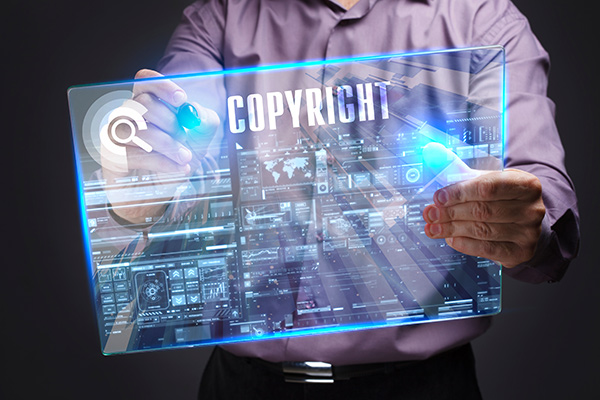
Music Licensing: Every two years, there’s new technology that has major copyright implications.
I was 14.
What I read, it sounded like you were a little kid. You were a teenager.
I was a teenager. I grew up in Harlem. The scene was shot in Harlem. Some of the scenes were shot down the street from my house. I go and I do and I meet all these legends. People that I’ve grown up as a kid, Ice-T did the scene with me. Wesley Snipes, Mario Van Peebles, Fab Five Freddy was one of the producers. These are people that I was like, “I cannot believe that I’m getting to meet these people.” I do my scene and months later the movie comes out and I’m like, “I’m going to be the man when I go back to school.” I went to performing arts high school too. I thought, “They’re going to love me.” I get back to school. My scene and what I did in the movie was I told Ice-T, who was plays the cop, where Nino Brown is, who’s the crook in the movie. I told him where the crook is. I snitch on Nino Brown. I’m like, “I’m the man.” Everybody who comes in is like, “You’re the snitch.” It was the worst day of my high school life.
Several years later, because I didn’t go straight to law school, I got hired at a large law firm. I was doing my summer gig. You come back and get hired full-time. Halfway through the summer, I’m walking out and one of the security guards at the front of the building sheepishly comes up to me and he’s like, “Excuse me, can I ask you a question?” I’m 30 by that time. He goes, “I’m wondering, were you in New Jack City?” I was like, “How is that possible? Yes, I was.” He turns around and he was like, “I told you.” I was like, “How is that possible?” I’m twice the size. How do I even look like that kid anymore? They recognized me.
They were like, “Stay away from that guy. He’s a snitch.”
Those are my two New Jack City stories.
Amazingly, you went to a performing arts school, because if you think about it, most stories you hear are about people who their parents wanted them to be lawyers and doctors, and they disappointed them by going into the arts. Somehow you did it completely backward.
My mom was running art institutions, so she would have been happy either way.
How does that feel like there’s a dance teacher that’s like, “I’m disappointed that you squandered your talent on a law degree.”
That happened. I’ll tell you one more acting story. I go to an audition. I was in high school. This guy liked me, but he looked at me and he recognized my mom. I don’t know how, but he knew who my mom was and I looked like my mom, especially back then. He looked at me. My mom’s name is Mary. He said, “Are you Mary Campbell’s son?” I was like, “Yeah.” He goes, “Man.” He wound up giving her a part opposite Susan Sarandon and I didn’t get the part. You’re welcome mom for getting you a part. That’s the truth. That’s why I’ve made me say it because I that tells it all.
That’s the day you decided to become a lawyer. You go, “I’m suing my mom.”
I auditioned and my mom gets the role. I should probably pick another profession.
You’re like, “I want a cut.”
I do whenever she gets the residual checks. She gets a $2 check. I’m like, “Give me my $0.10.”
What was the project for?
Lorenzo’s Oil. She was the principal who talks to Susan Sarandon when the boy is first getting ill.
New Jack City is still a bigger movie. She couldn’t take that away from you. Susan Sarandon or Ice-T? Ice-T wins every time.
He has better tweets.
Thank you so much for taking the time out to join us. This has been enlightening and I’m glad that you told us that I was right about how I got in town. That’s the real takeaway here. I appreciate that.
We all know that’s what mattered. You two are married?
Yes.
At the end of the day, that’s what matters most. I’m married. I know. That’s the question that matters.
To be clear, I never argued that way.
That’s the only way a guy gets to win.
I think about that an attorney argues for a living and when he goes home, he’s like, “Hang up the law shingle at the door. That is not going to fly.” Thank you so much. Where can people find you online if you would like to be found on Twitter or Instagram?
Twitter, Instagram, it’s @_Sekou_ and you can find me on my firm website at CulhaneMeadows.com.
Thank you so much. This has been enlightening and we appreciate it.
Thank you so much.
Thank you.
—
That was very enlightening. I love all the New Jack City stories. That was great. I think the real takeaway from that interview is that we were right. Let’s not undersell the fact that we were right. Basically, I just passed the Bar.
You can start practicing now.
I’m pretty much a lawyer.
For anyone who doesn’t know, that was a joke. I don’t want to get any nasty messages about it. It’s what I’m saying.
I normally I say, “What, pray tell, do you have in store for people next week?” I know because the last episode was supposed to be #CanadaBrenda, but because of the breaking news of the music stuff and we fell into this wonderful interview with somebody who knew a lot about it, we bumped that to the front of the line. Canada Brenda was kind enough to let us. I guess she couldn’t stop us. She’s all the way in Canada. She’s so nice.
As long as you said we’re sorry.
We’re going to say it in your native tongue, Canada Brenda.
We’re not trying to offend anyone.
Hers will be next week.
I’m excited. Canada Brenda is awesome. Everybody needs to know her. It’s Brenda Kraemer.
Until then, where can people find you?
People can find me at Facebook.com/CrystalDOKeefe. They can find me on, Twitter, Instagram, on the Bike and of course the Tread, @ClipOutCrystal.
They can find me on Twitter, @RogerQBert or on Facebook at Facebook.com/TomOKeefe. You can find the show online at Facebook.com/theclipout. While you’re there, like the page, join the group. Wherever you get your podcasts from, be sure and subscribe or follow, so you’ll never miss an episode. That’s it for this one. Thanks for tuning in. Until next time, keep pedaling and running.
Important Links:
- Apple Podcasts – The Clip Out
- Stitcher – The Clip Out
- Spotify – The Clip Out
- Facebook.com/theclipout
- John Mills
- Stryde Bike – article
- Episode 57 – Previous episode of The Clip Out
- Rebecca Kennedy on MindBodyGreen article
- MindBodyGreen.com
- Beyond The Beauty with Bobbi Brown
- What Should I Eat and Why Am I Always Hungry? With Nutritionist, Lauren Slayton
- Trevor Noah
- AdamEve.com
- Bustle.com
- Sekou Campbell
- Law360 – Sekou’s article
- Twitter – Sekou Campbell
- @_Sekou_ – Instagram
- CulhaneMeadows.com
- Facebook.com/CrystalDOKeefe
- Twitter – Crystal O’Keefe
- @ClipOutCrystal – Instagram
- @RogerQBert – Twitter
- Facebook.com/TomOKeefe
- https://www.Facebook.com/groups/RunLiftAndLive/permalink/2612934355496610/
- https://www.Facebook.com/nweir3/videos/10159378694846980/
- https://www.Bustle.com/p/how-meditating-changes-your-workout-according-to-experts-21816227
- https://www.Mindbodygreen.com/articles/peloton-master-trainer-rebecca-kennedy-tips-for-fitness-when-traveling
- https://www.Facebook.com/7976226799/posts/10158482801151800/
Join The Clip Out community today:

Subscribe
Keep up with all the Peloton news!
